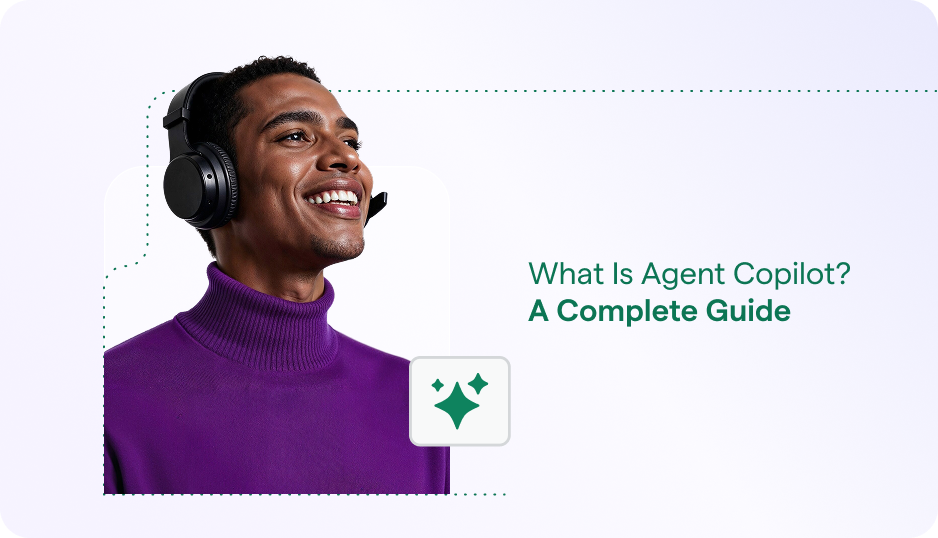The corporate hallways are humming with AI talk. “Agents” this and “Copilots” that — but wait, aren’t they the same thing in different packaging?
Not really.
In the pre-Gen AI years, AI in customer service was narrow AI (ANI) – purpose-built, good enough to execute limited functions. In contrast, AI Agents and AI Copilots are two systems that can team up with your staff, emulate human thinking, and help you be more productive. But behind the technicalities lies a simple question: Which one solves YOUR problems?
Short answer: Think of HAL 9000 from the Space Odyssey. That’s an AI Agent — autonomous, handling tasks without needing ongoing human interaction, but its role is task-specific — focusing on mission success.
On the other hand, Friday and TARS, from Iron Man and Interstellar, respectively, serve more like an AI Copilot — always providing real-time assistance, a back-and-forth dynamic, analyzing scenarios, and making suggestions based on the character’s needs.
Now, what’s best for your agents, and when? In this article, we help you compare and decide what fits your specific business problems.
AI Agent vs. Copilot: What It Means On The Surface
When companies pitch their AI solutions, they often blur the lines between these two distinct approaches: one works FOR you, and the other works WITH you. Let’s break it down.
What is an AI Agent?
An AI agent is an autonomous solution that can perceive its environment, process information, and take independent actions to complete specific tasks.
Unlike traditional bots that follow rigid instructions, these agents combine machine learning with advanced natural language processing to handle complex tasks with minimal human oversight.
For example, when a customer messages, “My account is locked after too many password attempts,” a basic chatbot might simply provide a link to password reset instructions. However, an AI agent immediately checks the customer’s account status, verifies their identity, assists in creating a secure temporary password, and provides actionable steps to troubleshoot the issues(all without a human stepping in).
The best AI agents are built by training the AI on extensive customer interaction data to handle unexpected turns in conversations and solve problems independently.
When is it useful?
An AI agent provides the most value in these scenarios:
- Ticket management: It prioritizes tickets and routes them to the right agents or teams without human involvement.
- Knowledge creation: It analyzes tickets in a helpdesk, identifying customer knowledge gaps and generating documentation to aid with self-service resources.
- Process improvement: It observes human agent workflows and recommends optimizations to streamline processes.
- End-to-end support: It assists players in gaming support by troubleshooting common issues, such as account recovery or connectivity problems, without waiting for a human agent. For example, if a player is locked out of their account, an AI agent can verify details, provide recovery steps, and escalate complex cases when needed.
As Gartner predicts, by 2028, AI Agents will be embedded in 33% of enterprise software (up from less than 1% in 2024) and will make about 15% of daily work decisions completely on their own.
What is an AI Copilot?
An AI Copilot is an AI-powered assistant that works alongside human support agents. It monitors real-time customer interactions and gives agents the information and guidance they need.
For example, in the same locked account scenario, the copilot instantly displays the account history, highlights recent failed login attempts, and suggests verification steps the agent should follow. It pulls up relevant security protocols and drafts a response explaining the recovery process, which the human agent can quickly review, personalize, and send.
Unlike tools that wait for agents to ask questions, the best copilots anticipate what agents need next and proactively offer help.
The system integrates directly into existing workflows and makes suggestions based on the current conversation and similar past cases. They don’t require agents to learn new systems or spend time hunting for information; the relevant help appears right when it’s needed.
When is it useful?
An AI copilot excels in these situations:
- Faster resolution times: Reducing handle times and speeding up resolutions, leading to faster outcomes for customers.
- Smart recommendations: Recommending the best course of action based on past ticket resolutions.
- Emotion intelligence: Detecting sentiment in customer messages and escalating tickets accordingly.
- Process optimization: Analyzing ticket patterns to suggest process improvements and better outcomes.
AI Agents Vs. Copilot: The Difference
Here’s a quick summary of the differences between AI Copilot vs. AI Agent:
| Capability | AI Copilot | AI Agent |
| Primary purpose | Increases human efficiency by working alongside staff | Brings results by executing tasks without human input |
| Decision making | Depends on human input for final decisions | Makes decisions independently within set guidelines |
| Task execution | Carries out tasks based on user instructions | Completes tasks on its own to achieve target outcomes |
| Learning style | Continuously improves from agent interactions and successful resolutions | Autonomously learns through direct customer conversations and refines responses |
| Interaction style | Conversational, collaborative approach | Task-focused, results-oriented approach |
| Best For | Creative work, complex decision support, planning strategy | Routine tasks, data processing, customer support automation |
| ROI | High – multiplies human agent effectiveness, reduces training time, and increases retention | High – automates routine tasks, enables 24/7 support, and reduces operating costs |
Business Outcomes with AI Copilots and Agents
For years, companies hesitated to invest in customer experience improvements because the financial payoff seemed too distant or unclear. Now, with AI tools showing measurable connections between operational efficiency and customer satisfaction, the business case is becoming much clearer.
- According to McKinsey, replacing a single contact center agent costs between $10,000 and $21,000. Copilots reduce employee turnover by making agents’ jobs less stressful and more satisfying.
- The National Bureau of Economic Research found that companies using AI assistants saw an average productivity increase of 14% per worker. Agents feel more confident and engaged when they have tools that help them succeed. It creates a more positive work environment and further boosts productivity.
To track your AI investment’s return, monitor these indicators:
- Agent productivity (inquiries handled per hour)
- Average handle time (how quickly issues are resolved)
- Customer satisfaction scores
- First-contact resolution rates
- Staff turnover percentages
Real-World Impact: Case Studies and Industry Examples
The theoretical business outcomes and metrics of AI sound promising, but what also matters is how these technologies perform in actual business environments. Let’s look at examples of AI Copilots and AI Agents in action.
Microsoft Support’s success with AI Copilot
Microsoft’s Customer Service and Support team, one of the world’s largest support organizations, implemented Dynamics 365 Copilot for 6,500 agents (with 5,000 agents in a control group). Look at the results:
- New agents onboarded faster and became productive more quickly, with a 12% reduction in average handle time for chat cases
- 10% of cases that typically required escalation to other team members were resolved independently
- Agents could continue conversations seamlessly when customers switched languages mid-chat
- Customer satisfaction remained high, with agents receiving top scores and feedback like “Very informative and to the point.”
Other organizations are following suit. Prada Group integrated Copilot with their Knowledge Base to help Client Service Advisors deliver faster assistance to luxury customers. Meanwhile, Vanguard Group is testing generative AI capabilities to improve customer care teams and self-service applications.
Paymentshield’s customer support success with AI Agents
UK insurance intermediary Paymentshield faced a challenging situation: their staff handled insurance administration and customer calls. They couldn’t keep up with all the phone calls and emails, and customers were stuck waiting in long lines. When COVID-19 hit, these problems intensified.
The company turned to Smart Intents and created 30 automated user-facing bot journeys that guided customers through self-service workflows, providing policy information and document access instructions without human intervention.
The results were impressive and immediate:
- 100% of requests received at least partial automation
- 82% of issues fully resolved without human help
- Average resolution time dropped to just 3.26 minutes
- A 57% reduction in policy cancellations
- A 6% increase in overall conversions
- 3,000+ fully automated claim chats in 2021, saving 340+ staff hours
- Customer satisfaction score reached 4.25 (an all-time high)
Smart Intents formed the foundation of 90% of customer support journeys, working around the clock to handle inquiries even outside business hours. The human staff, freed from routine questions, could focus on complex issues requiring their expertise.
Business Growth with An AI-powered Customer Service That Gets It
Let’s now see how you can actually implement similar solutions in your business today.
Helpshift’s comprehensive AI Agent Copilot solution focuses on four critical areas where agents often need the most support:
AI Sentiment: This feature reads between the lines of customer messages, identifying whether the customer is frustrated, confused, or satisfied. When a customer types, “This is the third time I’ve had this issue,” the copilot alerts the agent to the brewing frustration, such as “user sentiment changed from positive to negative or negative to positive,” for agents to respond with extra care and urgency.
AI Summary: The copilot creates concise summaries of what’s happening for tickets with lengthy back-and-forth exchanges. Agents joining a conversation midway no longer waste time scrolling through dozens of messages; they get a clear picture of the problem, what’s been tried, and why previous solutions failed.
AI Reply: When customers ask questions, the copilot immediately generates answer options based on similar past tickets and your company’s knowledge base. Agents need to simply review, personalize, and send (= less time spent searching for information).
Smart AI Compose: This feature acts like an expert editor to help agents polish their responses. It can adjust the tone from casual to professional, expand brief answers into more helpful ones, and fix grammar issues on the fly so that every customer gets clear, error-free communication.
Sign up for a 30-day free trial to test how Helpshift’s AI capabilities benefit your customer service operations.
FAQs
1. What is the difference between AI agents and AI copilots?
AI agents work independently to complete tasks without human input. They handle customer inquiries, sort tickets, and create knowledge resources independently. AI copilots support human staff by working alongside them. They suggest responses, flag customer emotions, and provide information while agents control final decisions.
The key difference is that agents replace human work, while copilots enhance it.
2. Is ChatGPT an AI agent?
No, ChatGPT isn’t an AI agent. While both use AI technology, they function differently. ChatGPT responds to human prompts but can’t act independently — it’s reactive and waits for instructions before generating text. True AI agents make decisions without human guidance. They can prioritize tasks, transfer information between systems, and complete goals.
3. What is the difference between an AI agent and an AI chatbot?
Chatbots follow preset conversation paths that someone built manually. They recognize specific keywords to give predetermined answers. AI agents use advanced language processing to understand questions in different forms. They can think through problems, make decisions, and act across systems.
While chatbots repeat information from their limited script, AI agents reason through situations and adapt their responses based on context.



